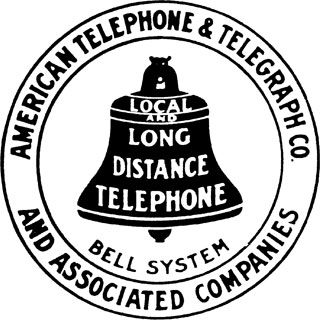At the turn of the 20th Century, Alexander Graham Bell's telephone patents had expired and competition had entered the market place. Independent telephone companies raced to establish themselves in markets as of yet unserved by AT&T Other markets saw the advent of "dual service," with multiple, but incompatible, telephone services. Businesses might have multiple phones on their desks in order to reach different customers on different networks.
AT&T faced competition. And to AT&T, competition was inefficient. AT&T President Theodore Vail proclaimed that there should be "One policy, one service: Universal Service." Vail could solve the problem of a telephone market where different phones could not talk to each other by establishing AT&T as the government sanctioned monopoly.
In order to solve the problem of the independents, AT&T leveraged an asset that the independents lacked: it's long distance network linking together the local Bell Operating Companies. AT&T benefited from Network Effect. Subscribers to the Bell networks could reach all the other subscribers to the Bell networks over the AT&T interconnected long distance network. The subscribers to the independent telephone networks could not.
The independent networks asked to interconnect with the AT&T network. AT&T refused. AT&T also, through its affiliation with J.P. Morgan, squeezed the Independents' access to financial capital. And also refused to sell superior Western Electric (which AT&T owned) equipment to its rivals.
The position of the independent networks became untenable. The independent telephone companies would crumble, either going out of business or selling out to AT&T.
Progressive era regulators grew wary of AT&T's anticompetitive strategy and filed suit in 1912. Rumors were also brewing in Congress about the possibility of nationalizing AT&T (something that would happen several years later during World War I).
In 1913, AT&T settled the antitrust actions with the Kingsbury Commitment in which AT&T agreed to interconnect its long distance network (not its local Bell Operating Companies) with independent telephone companies, stop acquiring independent telephone companies, and divest itself of Western Union.
At this point the damage to the competitive market had already been done and many crumbling independent telephone companies would have prefered it if AT&T had been permitted to buy them out. AT&T's strategy of establishing itself as the monopoly telephone network was well under way. By 1921, AT&T had achieved its strategy and competitive independent telephone providers dissolved from the market.

No comments:
Post a Comment